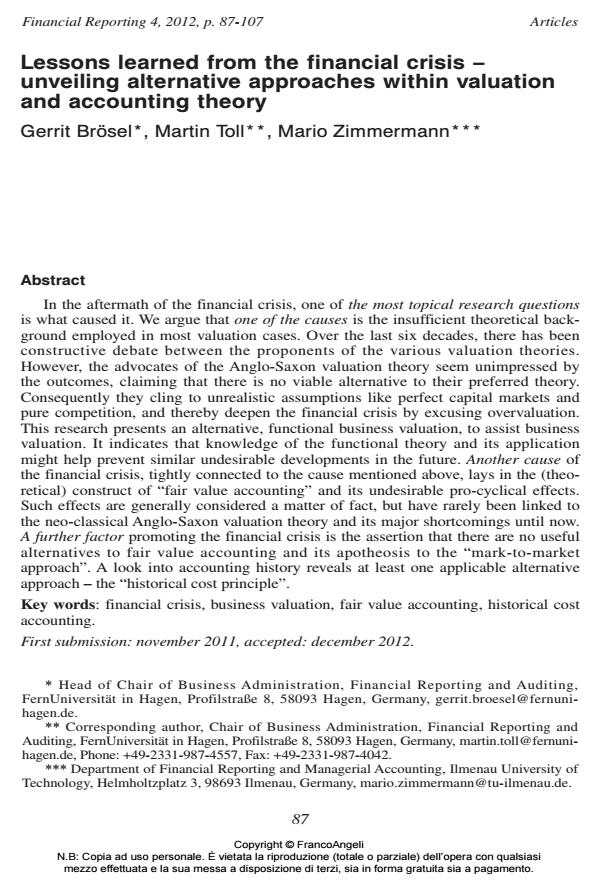Lessons learned from the financial crisis - unveiling alternative approaches within valuation and accounting theory
Journal title FINANCIAL REPORTING
Author/s Gerrit Brosel, Martin Toll, Mario Zimmermann
Publishing Year 2013 Issue 2012/4
Language English Pages 21 P. 87-107 File size 529 KB
DOI 10.3280/FR2012-004006
DOI is like a bar code for intellectual property: to have more infomation
click here
Below, you can see the article first page
If you want to buy this article in PDF format, you can do it, following the instructions to buy download credits

FrancoAngeli is member of Publishers International Linking Association, Inc (PILA), a not-for-profit association which run the CrossRef service enabling links to and from online scholarly content.
In the aftermath of the financial crisis, one of the most topical research questions is what caused it. We argue that one of the causes is the insufficient theoretical background employed in most valuation cases. Over the last six decades, there has been constructive debate between the proponents of the various valuation theories. However, the advocates of the Anglo-Saxon valuation theory seem unimpressed by the outcomes, claiming that there is no viable alternative to their preferred theory. Consequently they cling to unrealistic assumptions like perfect capital markets and pure competition, and thereby deepen the financial crisis by excusing overvaluation. This research presents an alternative, functional business valuation, to assist business valuation. It indicates that knowledge of the functional theory and its application might help prevent similar undesirable developments in the future. Another cause of the financial crisis, tightly connected to the cause mentioned above, lays in the (theoretical) construct of "fair value accounting" and its undesirable pro-cyclical effects. Such effects are generally considered a matter of fact, but have rarely been linked to the neo-classical Anglo-Saxon valuation theory and its major shortcomings until now. A further factor promoting the financial crisis is the assertion that there are no useful alternatives to fair value accounting and its apotheosis to the "mark-to-market approach". A look into accounting history reveals at least one applicable alternative approach - the "historical cost principle".
Keywords: Financial crisis, business valuation, fair value accounting, historical cost accounting.
- Unternehmensbewertung und ökonomische Analyse Florian Follert, Stefan Behringer, pp.69 (ISBN:978-3-658-40234-1)
- The calculating entrepreneur — The role of economic calculation in supporting alertness and creative destruction Eduard Braun, Florian Follert, in Managerial and Decision Economics /2024 pp.5668
DOI: 10.1002/mde.4341 - Fair value accounting and Austrian business cycle theory: what can we learn from the German crisis of 1873? Eduard Braun, Florian Follert, in Accounting History Review /2025 pp.259
DOI: 10.1080/21552851.2025.2487258 - Eugen Schmalenbach, Austrian economics, and German business economics Michael Olbrich, David J. Rapp, Florian Follert, in The Review of Austrian Economics /2022 pp.205
DOI: 10.1007/s11138-020-00520-x - On the Ethics of Fair Value Accounting: Distributive Effects, Distributive Injustice, and Implications for Social Peace David J. Rapp, Jeffrey M. Herbener, David Gordon, in Quarterly Journal of Austrian Economics /2024
DOI: 10.35297/001c.117210 - Agree or Disagree? On the Role of Negotiations for the Valuation of Business Enterprises Florian Follert, Jeffrey Herbener, Michael Olbrich, David Rapp, in Quarterly Journal of Austrian Economics /2019 pp.315
DOI: 10.35297/qjae.010001
Gerrit Brosel, Martin Toll, Mario Zimmermann, Lessons learned from the financial crisis - unveiling alternative approaches within valuation and accounting theory in "FINANCIAL REPORTING" 4/2012, pp 87-107, DOI: 10.3280/FR2012-004006